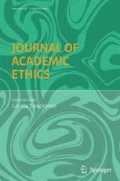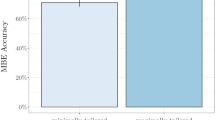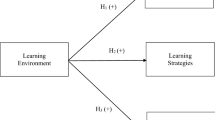Abstract
Despite recent growth in distance education, there has been relatively little research on whether online examinations facilitate student cheating. The present paper utilizes an experimental design to assess the difference in student performance between students taking a traditional, proctored exam and those taking an online, unproctored exam. This difference in performance is examined in a manner which considers both the effect of the different physical test environments and the possible effect of a difference in the opportunity for students to cheat. This study, utilizing regression models that also account for relevant control variables, examines 44 undergraduate statistics students, finds evidence that the difference in the testing environment creates a disadvantage to students taking the online exam which somewhat offsets the advantage that the unproctored students gain from greater opportunities to cheat.
Similar content being viewed by others
Notes
This evidence of high and increasing student cheating prevalence may be the source of even greater apprehension when one considers the evidence presented by Nonis and Swift (2001), Harding et al. (2004), Lawson (2004) and Harper (2006) to the effect that cheating behavior by college students is statistically related to a higher propensity to demonstrate dishonest behavior when such individuals move on to business or professional careers.
The Harmon and Lambrinos (2008) study also made an inference regarding student cheating in online exams by examining how well a regression model (featuring student GPA as an independent variable) explaining student exam scores predicted those exam scores in classes which relied on proctored exams versus classes which utilized online exams.
The original list of variables included in the stepwise regression procedure were: Section Dummy, score on the initial math test, hours employed, hours exercising, hours on the internet, math SAT, verbal SAT, GPA, credits completed, credits attempted, residential status, midterm grade, class attendance, homework grades, measures of procrastination in starting and submitting homework assignments and gender. The stepwise procedure uses partial correlation to determine which variable to add into the model which maximizes the coefficient of determination.
References
Allen, I., & Seaman, J. (2010). Class differences: online education in the United States, 2010. Babson Park, MA: The Sloan Consortium, Babson College.
Brown, B., & McInerney, M. (2008). Changes in academic dishonesty among business students in the United States, 1999–2006. International Journal of Management, 25(4), 621–632.
Campbell, D. T., & Stanley, J. C. (1966). Experimental and quasi-experimental designs for research. Skokie, IL: Rand McNally.
Cluskey, G., Ehlen, C., & Raiborn, M. (2011). Thwarting online exam cheating without proctor supervision. Journal of Academic and Business Ethics, 4, 1–7.
Coalter, T., Lim, C. L., & Wanorie, T. (2007). Factors that influence faculty actions: a study of faculty responses to academic dishonesty. International Journal for the Scholarship of Teaching and Learning, 1(1), 1–19.
Crown, D., & Spiller, M. (1998). Learning from the literature on collegiate cheating: a review of empirical research. Journal of Business Ethics, 17(6), 683–700.
Durden, G., & Ellis, L. (2003). Is class attendance a proxy variable for student motivation in economics classes? An empirical analysis. International Social Science Review, 78(1 & 2), 42–46.
Grijalva, T., Nowell, C., & Kerkvliet, J. (2006). Academic honesty and online courses. College Student Journal, 40(1), 180–185.
Harding, T., Carpenter, D., Finelli, C., & Passow, H. (2004). Does academic dishonesty relate to unethical behavior in professional practice? An exploratory study. Science and Engineering Ethics, 10(2), 311–324.
Harmon, O., & Lambrinos, J. (2008). Are online exams an invitation to cheat? Journal of Economic Education, 39(2), 116–125.
Harper, M. (2006). High tech cheating. Nurse Education Today, 26, 672–679.
Hollister, K., & Berenson, M. (2009). Proctored versus unproctored online exams: studying the impact of exam environment on student performance. Decision Sciences Journal of Innovative Education, 7(1), 271–294.
Keith-Spiegel, P., Tabachnick, B., Whitley, B., & Washburn, J. (1998). Why professors ignore cheating: opinions of a national sample of psychology instructors. Ethics & Behavior, 8(3), 215–227.
Kennedy, K., Nowak, S., Raghuraman, R., Thomas, J., & Davis, S. (2000). Academic dishonesty and distance learning: student and faculty views. College Student Journal, 34(2), 309–314.
Kidwell, L., & Kent, J. (2008). Integrity at a distance: a study of academic misconduct among university students on and off campus. Accounting Education: An International Journal, 17(Supplement), S3–S16.
Kitahara, R., Westfall, F., & Mankelwicz, J. (2011). New, multifaced hybrid approaches to ensuring academic integrity. Journal of Academic and Business Ethics, 3, 1–12.
Kolowich, S. (2013). Behind the webcam’s watchful eye, online proctoring takes hold. Chronicle of Higher Education. https://chronicle.com/article/Behind-the-Webcams-Watchful/138505/.
Lanier, M. (2006). Academic integrity and distance learning. Journal of Criminal Justice Education, 17(2), 244–261.
Lawson, R. (2004). Is classroom cheating related to business students’ propensity to cheat in the “real world”? Journal of Business Ethics, 49(2), 189–199.
Lewis, L., Snow, K., Farris, E., & Levin, D. (1999). Distance education at degree-granting education institutions: 1997–98. Washington, D.C.: National Center for Education Statistics, U. S. Department of Education.
McCabe, D., Treviño, L., & Butterfield, K. (2001). Cheating in academic institutions: a decade of research. Ethics & Behavior, 11(3), 219–232.
Nonis, S., & Swift, C. (2001). An examination of the relationship between academic dishonesty and workplace dishonesty: a multicampus investigation. The Journal of Education for Business, 77(2), 69–77.
Okpala, A., Okpala, C., & Ellis, R. (2000). Academic efforts and study habits among students in a principles of macroeconomics course. Journal of Education for Business, 75(4), 219–224.
Parsad, B., & Lewis, L. (2008). Distance education at degree-granting postsecondary institutions, 2006–07. Washington, D.C.: National Center for Education Statistics, U.S. Department of Education.
Peng, Z. (2007). Giving online quizzes in corporate finance and investments for a better use of seat time. The Journal of Educators Online, 4(2), 1–18.
Porter, S. R. (2011). Do college student surveys have any validity? The Review of Higher Education, 35(1), 45–76.
Rodarte-Luna, B., Sherry, A., & Kim, S. H. (2006). Statistics anxiety, procrastination and the use of self-regulation. Presentation to the American Psychological Association.
Rogers, C. (2006). Faculty perceptions about e-cheating during online testing. Journal of Computing Sciences in Colleges, 22(2), 206–213.
Schneider, A. (1999). Why professors don’t do more to stop students who cheat. Chronicle of Higher Education, 45(20), A8–A10.
Stuber-McEwen, D., Wiseley, P., Masters, C., Smith, A., & Mecum, M. (2005). Faculty perceptions versus students’ self-reported frequency of academic dishonesty. Paper presented at the 25th Annual Meeting of the Association for Psychological & Educational Research in Kansas, Emporia, KS.
Stuber-McEwen, D., Wiseley, P., & Hoggat, S. (2009). Point, click, and cheat: frequency and type of academic dishonesty in the virtual classroom. Online Journal of Distance Learning Administration, 12(3). http://www.westga.edu/~distance/ojdla/fall123/stuber123.html.
Yates, R., & Beaudrie, B. (2009). The impact of online assessment on grades in community college distance education mathematics courses. The American Journal of Distance Education, 23(2), 62–70.
Acknowledgments
The authors wish to thank David Fask for his helpful comments on an earlier draft of the paper.
Author information
Authors and Affiliations
Corresponding author
Rights and permissions
About this article
Cite this article
Fask, A., Englander, F. & Wang, Z. Do Online Exams Facilitate Cheating? An Experiment Designed to Separate Possible Cheating from the Effect of the Online Test Taking Environment. J Acad Ethics 12, 101–112 (2014). https://doi.org/10.1007/s10805-014-9207-1
Published:
Issue Date:
DOI: https://doi.org/10.1007/s10805-014-9207-1




